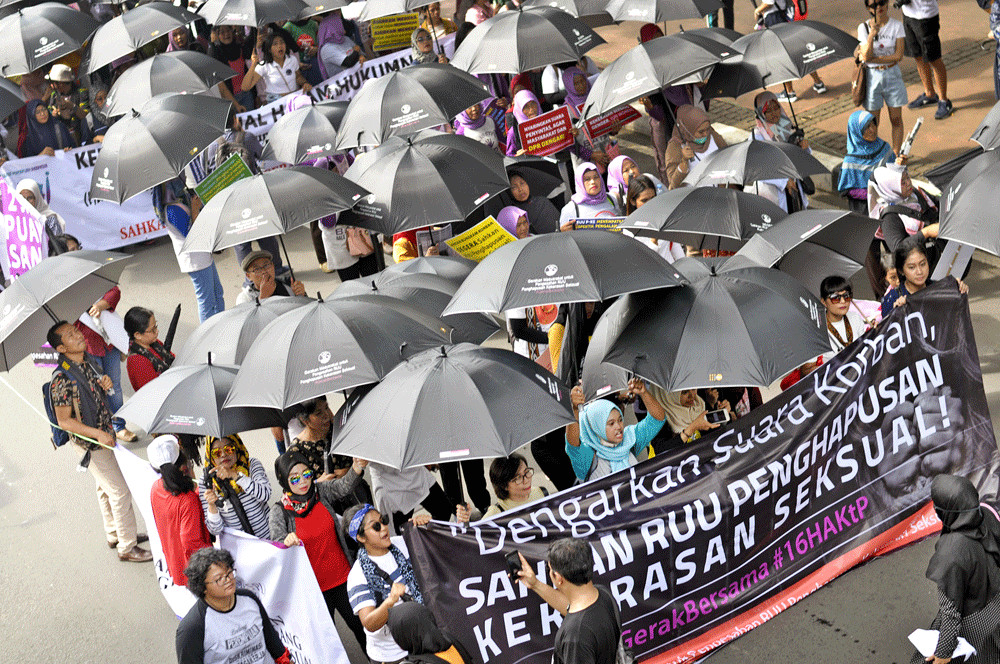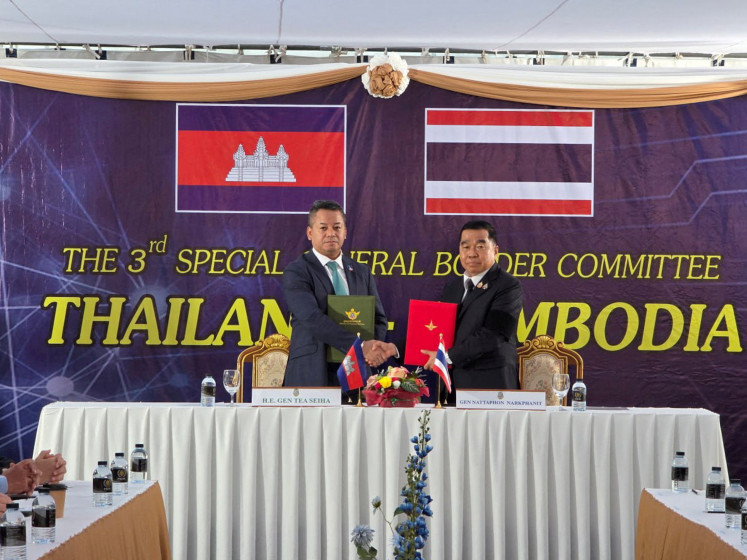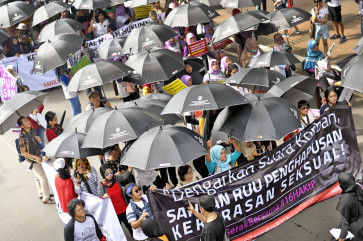Popular Reads
Top Results
Can't find what you're looking for?
View all search resultsPopular Reads
Top Results
Can't find what you're looking for?
View all search resultsWhen the PKS party collides with the PKS bill
Is it because we are lazy that we Indonesians have a penchant for acronyms? But they can be problematic as the same acronym can stand for different things.
Change text size
Gift Premium Articles
to Anyone
 Standing up against sexual violence: Carrying black umbrellas, activists march on Jl. MH Thamrin, Central Jakarta toward Aspiration Park near the Presidential Palace. The activists held a mass rally as part of this year’s global 16 Days of Activism Against Gender-based Violence campaign, during which they called on the government to immediately pass the sexual violence eradication bill into a law. (The Jakarta Post/Iqbal Yuwansyah)
Standing up against sexual violence: Carrying black umbrellas, activists march on Jl. MH Thamrin, Central Jakarta toward Aspiration Park near the Presidential Palace. The activists held a mass rally as part of this year’s global 16 Days of Activism Against Gender-based Violence campaign, during which they called on the government to immediately pass the sexual violence eradication bill into a law. (The Jakarta Post/Iqbal Yuwansyah)
I
s it because we are lazy that we Indonesians have a penchant for acronyms? But they can be problematic as the same acronym can stand for different things. For example, API stands for Akademi Perawat Indonesia (Indonesian Nurses Academy), Asosiasi Pertekstilan Indonesia (Indonesian Association of Textiles) and Almanak Politik Indonesia, which was the name of the political NGO I founded in 1999.
Most political parties are known by their acronyms, e.g. Golkar (Golongan Karya), the PSI (Indonesian Solidarity Party) or the PKS (Justice Prosperous Party). Recently, the PKS has been appearing in the media together with another PKS. Really? Which PKS is that? Well, the second PKS stands for Penghapusan Kekerasan Seksual (elimination of sexual violence), in connection with a bill that the House of Representatives has been deliberating since May 2016.
All parties, including the parties of President Joko “Jokowi” Widodo and his opponent Prabowo Subianto, agree that the bill should be passed, and with reason, considering the prevalence of sexual violence.
This particular bill was triggered by the “shocking public gang-rape of a 13-year-old schoolgirl by 14 drunk men in Bengkulu” in 2016 which made activists call for its legislation to be sped up.
According to the United Nations Population Fund (UNFPA), more than one in three Indonesian women between “the ages of 15 and 64 have experienced physical and sexual violence in their lifetime”. That’s a jaw-dropping figure, but guess what? The UNFPA stats say that it is most likely much higher as 90 percent of rape cases go unreported. 90 percent? Go figure.
The National Commission on Violence Against Women (Komnas Perempuan), identifies 15 kinds of sexual violence: 1) rape, 2) sexual intimidation including threat or attempted rape, 3) sexual harassment, 4) sexual exploitation, 5) sex trafficking of women or girls, 6) forced prostitution, 7) sexual slavery, 8) forced marriage, including cerai gantung (when a woman wants to get divorced but is forced to remain in the marriage), 9) forced pregnancy, 10) forced abortion, 11) forced contraception and sterilization, 12) sexual torture or abuse, 13) inhumane punishment with sexual overtones, 14) traditional customs with sexual nuances that are dangerous or discriminatory toward women, 15) sexual control, including discriminatory regulations using morality or religious reasons.
It’s a pretty long list, but Komnas Perempuan says it’s not even exhaustive as there may be other forms of sexual violence that are as yet unknown. But in any case, all the 15 types of sexual violence are pretty clear, so how did PKS the party see it as “promoting free sex and deviant sexual behavior”. Hello, come again?

















